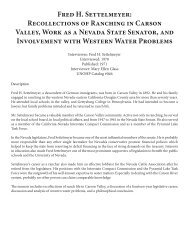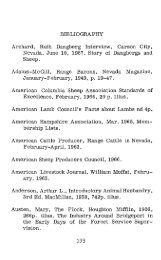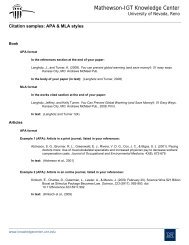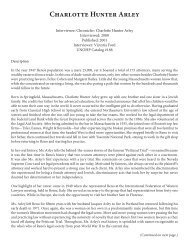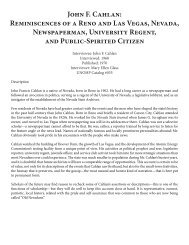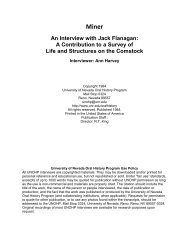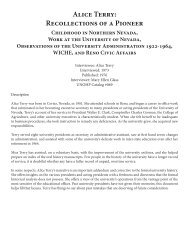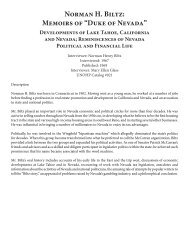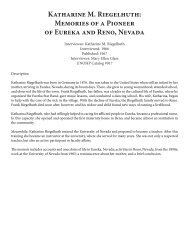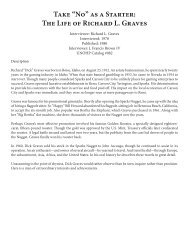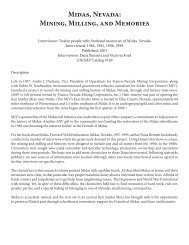Silvio Petricciani - University of Nevada, Reno
Silvio Petricciani - University of Nevada, Reno
Silvio Petricciani - University of Nevada, Reno
You also want an ePaper? Increase the reach of your titles
YUMPU automatically turns print PDFs into web optimized ePapers that Google loves.
U.S. Army, 1943-1945<br />
67<br />
And, oh, incidentally, I applied for<br />
Officer’s Candidate School while I was in the<br />
company, but the company clerk, a fellow by<br />
the name <strong>of</strong> Jones, came to me and told me,<br />
he says, “You’ll never leave this company.”<br />
And I said, “Why?”<br />
He said, “Well, you’ve been accepted at<br />
Officer’s Candidate School, but the company<br />
commander stopped it.” That’s right.<br />
He says, “You see, if a company commander<br />
will go to the higher-ups and say, ‘This man<br />
is too valuable to me,’ that stopped it right<br />
there.” Sol never did get to Officer’s Candidate<br />
School. I went before the Board and passed<br />
the Board. I got the notice I had passed the<br />
Board, and I’d be notified later. And I was<br />
never notified. So you see, even politics in<br />
the service.<br />
As a matter <strong>of</strong> fact, there was another<br />
fellow—this is documented fact because this<br />
other fellow and myself, we also had applied<br />
for the Army specialized training program,<br />
which was college. And they would release<br />
you from your active duty and go to college<br />
and then become an <strong>of</strong>ficer also. And as<br />
a matter <strong>of</strong> fact, this fellow and I are very<br />
good friends right now. His name is Sam<br />
Siegel; he’s an attorney in Long Beach area,<br />
and all these facts can be attested to. I’m not<br />
talking out <strong>of</strong> turn or anything, but these are<br />
the things that actually happened. And I’m<br />
not crying about it, don’t misunderstand,<br />
because as I say my service experience was<br />
very rewarding. I learned a lot, and I was very<br />
conscientious about my job in the service,<br />
and I think I did a good job, came out with<br />
an honorable discharge. And I did get a medal<br />
for achievement as I told you before.<br />
So I went on through our stateside duties,<br />
and then the division was finally called up<br />
in October. But it was really called up in<br />
September, and we had to get ready to ship<br />
to a place called Camp Shanks, New York,<br />
our port <strong>of</strong> embarkation, and from New York<br />
we shipped overseas. And, well, we had our<br />
Thanksgiving dinner in New York and then<br />
we left. We had thirteen days going overseas.<br />
We landed in Marseilles, France and from<br />
Marseilles we went to our staging area. And<br />
then we went <strong>of</strong>f to the front lines. And we<br />
spent a hundred and forty-three days on the<br />
front lines.<br />
It was quite interesting. The wartime<br />
is very, very funny. It’s comical other than<br />
you know that you’re in a position where<br />
you might get killed. But there were a lot <strong>of</strong><br />
comical incidents overseas. Like, we were<br />
in Marseilles, and we had a big staging area<br />
up on [what] we called Windy Hill. And the<br />
Germans would send bombers over at night<br />
and <strong>of</strong> course, in the states everything was<br />
blackout, this, that and the other thing. And<br />
here on Windy Hill you had your big bonfires<br />
and everything else going, and nobody paid<br />
any attention to it whatsoever because the<br />
bombers were going out and trying to bomb<br />
the ships that were in the harbor that were<br />
hauling fuel and stuff like that. They could<br />
care less about the GI troops who were up<br />
on the hill. Nobody paid any attention; the<br />
bonfires just kept on going, and it was a<br />
completely different situation than stateside.<br />
And then, <strong>of</strong> course, we were all outfitted,<br />
and we started moving up to the front lines.<br />
And on our way up there we got caught on<br />
the southern end <strong>of</strong> the Battle <strong>of</strong> the Bulge,<br />
and we were completely surrounded for about<br />
a week. This was just around Christmastime.<br />
As a matter <strong>of</strong> fact, I recall it was very, very<br />
cold, and we were amongst a group <strong>of</strong> people<br />
that had 90-millimeter anti-aircraft guns,<br />
and they had no shells to fire. And we dug<br />
ourselves what we called six-man foxholes.<br />
What we would do is dig the crust <strong>of</strong> the<br />
earth so that we could put an anti-tank mine<br />
in there and then blow the anti-tank mine up



